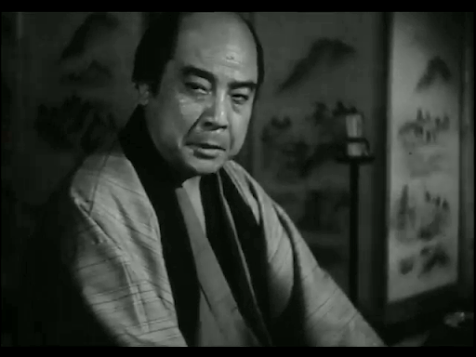Obscure Japanese Film #95
 |
| Denjiro Okochi |
This Daiei production stars silent screen veteran Denjiro Okochi as Takizo, a wandering samurai and master swordsman who returns incognito to the town where he was born, hoping to shake off some men pursuing him. Once there, he meets Sahei (Koichi Katsuragi), a widowed farmer, to whom he will later confess that his mother (now deceased) was a maid who became pregnant by a criminal and had to give birth to him in a warehouse.
 |
| Michiko Hoshi |
Sahei has two daughters, Okimi (Michiko Hoshi) and Omitsu (Kazuko Takamori). Unable to pay the annual tax, Sahei asks government official Yamagataya (Ryanosuke Higashi) to take Omitsu in as an indentured servant instead. Yamagataya agrees, but secretly intends to pimp her out.
 |
| Kotaro Bando |
 |
| Ramon Mitsusaburo |
Meanwhile, Inoyuki (Kotaro Bando) visits a gambling den owned by Hikigoro (Ramon Mitsusaburo from The Mysterious Edogawa Ranzan) in an attempt to raise money so that his sick wife Okichi (Mitsuko Mito) can take a rest, but he loses and is tricked into signing Okichi over to Hikigoro. Observing the way the innocent townspeople are abused and cheated by the powerful and corrupt, Takizo decides that it’s time to for him to come out of hiding and intervene…
 |
| Mitsuko Mito |
Based on an original work by Shintaro Mimura, the screenplay was written by Kaneto Shindo, who must not only have been the most prolific screenwriter of all time, but who also maintained an impressively high standard throughout his 70-year career. Director Taizo Fuyushima (1901-81) was new to me, but on this evidence he seems worthy of further investigation as Joshu karasu features excellent mobile camerawork courtesy of Yasukazu Takemura, some very well-co-ordinated and complex staging, a lively sense of rhythm in the editing and a strong ensemble cast, including that reliable old scene-stealer Daisuke Kato as a travelling con artist.
 |
| Daisuke Kato |
 |
| Atsushi Watanabe and Toshiaki Konoe |
Atsushi Watanabe and Toshiaki Konoe are also great fun as a couple of oddball palanquin carriers, one of whom has a topknot with a life of its own. The fight scenes are well above-average for 1951, too – one even takes place in heavy rain, which would soon become a Kurosawa trademark (not the only time this film brought Kurosawa to mind).
 |
| Denjiro Okochi |
It’s a marvel how the Japanese cinema of this period appears to have been populated with an almost endless number of excellent directors of whom we’ve never heard. Taizo Fuyushima’s career stretched back to 1926 and he directed over 90 films, mainly period dramas, but he seems to be almost completely forgotten. After his retirement, he made kabuki paper dolls, at which he was considered a master, and took on a number of pupils.
 |
| Denjiro Okochi and Koichi Katsuragi |
Watch on my YouTube channel (no subtitles)
No comments:
Post a Comment